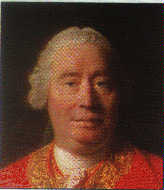|
|
Syllabus for Philosophy 251.504 and 251.507: Introduction to Philosophy Phil
251.504: Tuesday
& Thursday 2:20-3:35 (ARCA 107A) Phil
251.507: Tuesday
& Thursday Fall 2009, Dr. Stephen H. Daniel |
|

In
Introduction to Philosophy you
will develop
the critical-thinking
skills needed to write and speak effectively about the nature of human
existence,
religious belief, mind, freedom, knowledge, ethics, and political
obligations. This
means being able to identify issues, give arguments for philosophical
positions,
critique those arguments, formulate replies to those criticisms, and
indicate how
these discussions are significant in terms of one another.
| Class Date | Topic | Reading Assignment | Class Date | Topic | Reading Assignment |
|
Sept. 1 |
Introduction |
|
Oct. 27 |
Skepticism |
165-75 |
| Sept. 3 | Meaning of life |
3-15 |
Oct. 29 |
Knowledge & experience |
175-84 |
| Sept. 8 | Ancient solutions |
15-28 |
Nov. 3 |
Justification & relativism |
184-201 |
| Sept. 10 | Religious solutions |
28-40 |
Nov. 5 |
Scientific knowledge |
201-209 |
| Sept. 15 | God; cosmological argument | 43-53 | Essay 2 (Ch. 4-5 analysis question) due | ||
| Sept. 17 | Other arguments for God's existence, criticisms | 53-66 | Nov. 10 |
Moral objectivity & relativism |
213-22 |
| Nov. 12 |
Egoism & moral reasoning |
222-334 |
|||
| Sept. 22 | Problem of evil |
66-73 |
Nov. 17 |
Virtues & gender |
234-40 |
| Sept. 24 | Religious belief, pluralism |
73-88 |
Nov. 19 |
Moral duty |
240-47 |
| Essay 1 (Ch. 1-2 analysis question) due |
|||||
| Sept. 29 | Consciousness, other minds |
91-100 |
Nov. 24 |
Utilitarianism |
247-56 |
| Oct. 1 |
Personal identity, dualism |
100-114 |
(Nov. 26) |
(No
class: Thanksgiving holiday) |
|
| Oct. 6 |
Materialism |
114-24 |
Dec. 1 |
Social contract & rights |
259-73 |
| Oct. 8 |
Artificial intelligence |
124-34 |
Dec. 3 |
Individual & community |
273-86 |
| Oct.
13 |
Mid-semester exam |
Dec. 8 |
Government coercion & war |
286-301 |
|
| Oct. 15 |
Determinism |
137-46 |
Dec. 11 (Friday) |
Sec. 507 Final exam 3:00-5:00 p.m. |
|
| Oct. 20 |
Free will |
146-53 |
Dec. 16 (Wednesday) |
Sec. 504 Final exam 1:00-3:00 p.m. |
|
| Oct. 22 |
Freedom & God |
153-62 |
Cell phones must be turned off during class. | ||
Grades:
- The semester grade is based on two 1000-word essays (15 points each), a mid-semester exam (30 points), and the final exam (40 points). Essays are based on one of the “For Analysis” questions at the end of the designated chapters. If you get your essay to me at least two weeks before the due date, I will provide you with feedback and allow you to re-write your submission (once) if you choose. There is no grade for attendance or participation, but demonstration of class preparedness affects the grading of essays.
- During the semester each student will make two five-minute presentations to the class: one will summarize the basic positions and arguments discussed in the reading, the other will be a critique of those views. The critique will include objections mentioned in the text or raised by the student him/herself, or questions about the reading or the other student’s summary. Because these presentations are part of a student’s normal contribution to class discussions, they will not have an additional grade assigned to them.
- If you miss the deadline for submitting the two-page essays,
or miss the mid-semester or final exam, contact Dr. Daniel immediately. Expectations of the
quality of essays rise if essays are submitted past the deadline, and
grades are adjusted accordingly.
This class is being offered at two different times. If on a rare occasion you cannot attend your regularly scheduled class, you can come to the other section on that day as long as you notify the instructor.

| Instructor: Dr. Daniel |
Teaching
Assistant: Jen Gaffney |
| Office
(Bolton 302-B) hours: Tuesday & Thursday 10:00-11:00, 12:30-2:00 |
Office
(Bolton 311) hours: Monday & Wednesday 2:00-4:00 |
| Phone:
979-845-5619 (office), 979-846-4649 (home) |
Phone:
979-845-0489 |
| E-mail: sdaniel@people.tamu.edu |
E-mail: j-gaffney@people.tamu.edu |
Students with disabilities are
guaranteed a
learning
environment that provides for reasonable accommodation of their
disabilities.
If you believe you have a disability requiring an accommodation, please
contact the Department of Student Life, Disability Services, Cain Hall
B118, or call 845-1637.
Students are bound by
the Aggie
honor
code not to lie, cheat, steal, or tolerate those who do. Using notes
during a quiz or test, submitting
another someone else's work as one's own (e.g., plagiarizing from the
Internet), copying from another student's
test, or modifying a previously graded test to improve the grade are
acts of scholastic dishonesty. If you
violate the code, you will fail the course; no second chances.
For more on cheating and plagiarism, see
http://www.tamu.edu/aggiehonor/.

